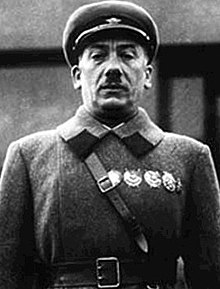Genrikh Yagoda
| Genrikh Grigoryevich Yagoda Russian: Генрих Григорьевич Ягода |
|
|---|---|

Genrikh Grigoryevich Yagoda at the podium in 1936
|
|
| People's Commissar for Internal Affairs (NKVD) | |
|
In office 10 July 1934 – 26 September 1936 |
|
| Preceded by | Vyacheslav Menzhinsky |
| Succeeded by | Nikolai Yezhov |
| Personal details | |
| Born |
Yenokh Gershevich Iyeguda 7 November 1891 Rybinsk, Russian Empire |
| Died | 15 March 1938 (aged 46) Moscow, Russian SFSR, Soviet Union |
| Nationality | Soviet |
| Political party | Communist Party of the Soviet Union |
| Spouse(s) | Ida Averbach |
Genrikh Grigoryevich Yagoda (Russian: Ге́нрих Григо́рьевич Яго́да; 7 November 1891–15 March 1938), born Yenokh Gershevich Iyeguda (Russian: Енох Гершевич Иегуда) was a Soviet-Russian secret police official who served as director of the NKVD, the Soviet Union's security and intelligence agency, from 1934 to 1936. Appointed by Joseph Stalin, Yagoda supervised the arrest, show trial, and execution of the Old Bolsheviks Lev Kamenev and Grigory Zinoviev, events that initiated the Great Purge. Yagoda also supervised the construction of the White Sea–Baltic Canal with Naftaly Frenkel, using slave labor from the GULAG system, during which many laborers died.
Like many Soviet secret policemen of the 1930s, Yagoda himself was ultimately a victim of the Purge. He was demoted from the directorship of the NKVD in favor of Nikolai Yezhov in 1936 and arrested in 1937. Charged with the crimes of wrecking, espionage, Trotskyism and conspiracy, Yagoda was a defendant at the Trial of the Twenty-One, the last of the major Soviet show trials of the 1930s. Following his confession at the trial, Yagoda was found guilty and shot.
Yagoda was born in Rybinsk into a Jewish family. The son of a jeweller, trained as a statistician, who worked as a chemist's assistant, he claimed that he was an active revolutionary from the age of 14, when he worked as a compositor on an underground printing press in Nizhni-Novgorod, and that at the age of 15 he was a member of a fighting squad in the Sormovo district of Nizhi-Novgorod, during the violent suppression of the 1905 revolution. One of his brothers was killed during the fighting in Sormovo; the other was shot for taking part in a mutiny in a regiment during the war with Germany. He said he joined the Bolsheviks in Nizhni-Novgorod at the age of 16 or 17, and was arrested and sent into exile in 1911. Before his arrest, he married Ida Averbakh, one of whose uncles, Yakov Sverdlov, was a prominent Bolshevik, and another, Zinovy Peshkov, was the adopted son of the writer Maxim Gorky. In 1913, he moved to St Petersburg to work at the Putilov steel works. After the outbreak of war, he joined the army, and was wounded in action.
...
Wikipedia
